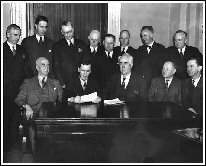FRtR > Outlines > The American Government > The Legislative Branch: The Reach of Congress > Congressional Powers of Investigation
An Outline of American Government
The Legislative Branch: The Reach of Congress
Congressional Powers of Investigation
*** Index * < Previous Chapter * Next Chapter > ***
One of the most important
nonlegislative functions of the
Congress is the power to investigate. This power is usually
delegated to committees -- either the standing committees,
special committees set up for a specific purpose, or joint
committees composed of members of both houses. Investigations
are conducted to gather information on the need for future
legislation, to test the effectiveness of laws already passed, to
inquire into the qualifications and performance of members and
officials of the other branches, and on rare occasions, to lay
the groundwork for impeachment proceedings. Frequently,
committees call on outside experts to assist in conducting
investigative hearings and to make detailed studies of issues.
 There are important corollaries to the investigative power. One
is the power to publicize investigations and their results. Most
committee hearings are open to the public and are widely reported
in the mass media. Congressional investigations thus represent
one important tool available to lawmakers to inform the citizenry
and arouse public interest in national issues. Congressional
committees also have the power to compel testimony from unwilling
witnesses, and to cite for contempt of Congress witnesses who
refuse to testify and for perjury those who give false testimony.
There are important corollaries to the investigative power. One
is the power to publicize investigations and their results. Most
committee hearings are open to the public and are widely reported
in the mass media. Congressional investigations thus represent
one important tool available to lawmakers to inform the citizenry
and arouse public interest in national issues. Congressional
committees also have the power to compel testimony from unwilling
witnesses, and to cite for contempt of Congress witnesses who
refuse to testify and for perjury those who give false testimony.
*** Index * < Previous Chapter * Next Chapter > ***
 There are important corollaries to the investigative power. One
is the power to publicize investigations and their results. Most
committee hearings are open to the public and are widely reported
in the mass media. Congressional investigations thus represent
one important tool available to lawmakers to inform the citizenry
and arouse public interest in national issues. Congressional
committees also have the power to compel testimony from unwilling
witnesses, and to cite for contempt of Congress witnesses who
refuse to testify and for perjury those who give false testimony.
There are important corollaries to the investigative power. One
is the power to publicize investigations and their results. Most
committee hearings are open to the public and are widely reported
in the mass media. Congressional investigations thus represent
one important tool available to lawmakers to inform the citizenry
and arouse public interest in national issues. Congressional
committees also have the power to compel testimony from unwilling
witnesses, and to cite for contempt of Congress witnesses who
refuse to testify and for perjury those who give false testimony.